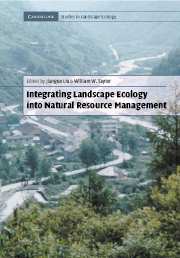Book contents
- Frontmatter
- Contents
- List of contributors
- Foreword
- Preface
- Acknowledgments
- PART I Introduction and concepts
- PART II Landscape structure and multi-scale management
- PART III Landscape function and cross-boundary management
- PART IV Landscape change and adaptive management
- 10 A landscape-transition matrix approach for land management
- 11 Tactical monitoring of landscapes
- 12 Landscape change: Patterns, effects, and implications for adaptive management of wildlife resources
- 13 Landscape ecology in highly managed regions: The benefits of collaboration between management and researchers
- PART V Landscape integrity and integrated management
- PART VI Syntheses and perspectives
- Index
- Plate Section
13 - Landscape ecology in highly managed regions: The benefits of collaboration between management and researchers
Published online by Cambridge University Press: 14 January 2010
- Frontmatter
- Contents
- List of contributors
- Foreword
- Preface
- Acknowledgments
- PART I Introduction and concepts
- PART II Landscape structure and multi-scale management
- PART III Landscape function and cross-boundary management
- PART IV Landscape change and adaptive management
- 10 A landscape-transition matrix approach for land management
- 11 Tactical monitoring of landscapes
- 12 Landscape change: Patterns, effects, and implications for adaptive management of wildlife resources
- 13 Landscape ecology in highly managed regions: The benefits of collaboration between management and researchers
- PART V Landscape integrity and integrated management
- PART VI Syntheses and perspectives
- Index
- Plate Section
Summary
Introduction
Land managers, resource biologists, and theoretical ecologists have all recognized the importance of expanding the spatial and temporal scales of their respective disciplines. Indeed, calling for a greater acknowledgement of the landscape perspective in both research and management is commonplace (Pilcher and Dunning, 2000). Actually implementing a greater reliance on landscape planning is less common. The reluctance to embrace this expansion is two-fold. First, many land managers are hesitant to embrace novel concepts and instead view research as a diversion from their primary management goals. Second, research ecologists tend to shy away from working in highly manipulated regions, preferring to study less developed or more natural regions, where the researcher is in more control of long-term changes in land treatment. The purpose of this chapter is to address this reluctance by defining how managers and researchers can both gain substantially by collaborating on research and planning, thereby expanding understanding at the landscape scale.
Land managers are increasingly called upon to manage adaptively (Walters, 1986), that is, to treat management strategies as large-scale experiments. Ideally, management practices would be conducted with a specific goal in mind regarding the kind of ecosystems that will result from the management, not just the kinds of marketable products. Scientists associated with the management agency would monitor the system to determine if these ecosystem goals were being met, and management would be modified if needed.
Landscape studies should be very relevant to adaptive management. Ecosystem attributes that could be monitored in an adaptive management framework might include landscape variables, such as the level of connectivity between habitat patches and the patterns of species diversity and habitat distributions across the entire region.
- Type
- Chapter
- Information
- Integrating Landscape Ecology into Natural Resource Management , pp. 334 - 346Publisher: Cambridge University PressPrint publication year: 2002
- 1
- Cited by



